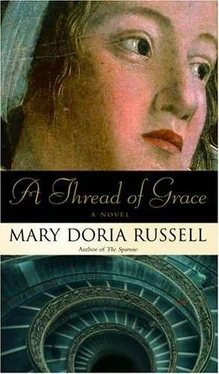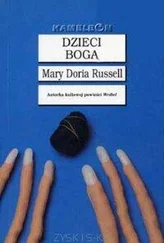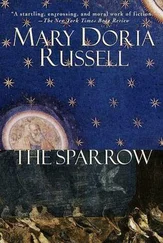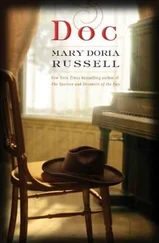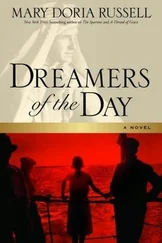“I don’ wanna! Where’s Antoinette?”
“Hush!” Her mother hands Steffi the china-faced doll. “Hold her tight!”
Canvas flaps jerk open. Everybody jumps. “The first convoy’s gone on, but there’re more coming up the road.” Santino motions for Claudette to jump down while Albert translates. “We’re leaving the truck here.”
The driver has nosed the vehicle into a thicket. Duno helps him heap branches against the truck for camouflage while the others assess the terrain. The nearest mountain rises steeply from a stony riverbed. Three days ago, this would have seemed an impossible climb.
Draping rolled-up army blankets over their shoulders and slinging mess kits around their necks, the Mannheimers jump from the truck calling “ Mazel! ” to the Blums and Brösslers. “Claudette,” Frau Brössler asks, “may we come with you and your soldier?” Duno starts to protest. Claudette narrows her eyes at him. Frau Brössler stops them both with a look. “Go ask your father, Claudette.”
Another quick conference, from German to Italian and back again. The soldier grimaces— a barely perceptible change. It’s probably more responsibility than he wants, Frieda thinks. Nevertheless, he takes it with good grace, and lifts Steffi onto his shoulders.
For a long time, the only sound is the crash of vegetation and the huff of their own labored breathing as they climb. “ Mutti! You’re going too fast!” Liesl complains, bringing up the rear. “I can’t—”
The flat crack of a single gunshot in the distance silences her. “ Un cacciatore, ” Santino says casually. “A hunter,” Albert translates with matching, if breathless, composure.
Everyone above the age of nine stares, first at Albert Blum, then at Santino. A rattling burst of machine pistol fire confirms their silent skepticism, and all discussion ceases. They grip roots, haul on branches, making for higher ground. Knapsacks full of ration cans thump against their backs. Wild berry canes snap at legs and faces. Thorns rip clothes and scratch tender skin. For the next two hours, not even Liesl complains.
“ Mangeremo qui, ” Santino says, unslinging his ’91 and leaning the rifle barrel against a fallen log beside a miniature waterfall.
“We’ll eat here,” Albert translates, dropping onto the log near the carbine.
Clutching Antoinette’s china face, Steffi whimpers when the soldier lets her slide off his back to the ground. “What are you crying about?” Liesl snarls. “You got to ride!”
Duno looks around. “We’re lost.” No one answers. “We’re lost!” he says louder.
“Maybe that’s good,” Albert says. “The Germans will be lost, too!”
“You’re always so cheerful,” Claudette grouses, flopping onto the ground.
“The truck driver said there was a village over there,” Duno claims, pointing. “ Una villa! ” Santino levers open ration tins, playing deaf. “We should have crossed the ridge where that pine tree comes out of those rocks. We’re going in circles.”
“And you have such a lot of experience in these matters, Mr. Fenimore Cooper?” his father asks. “You know the woods better than a man born here?”
“He wasn’t born here,” Claudette feels compelled to point out.
“Don’t mix in, Claudette!” her father warns, taking a tin from Santino.
“Papa, he’s from Calabria!”
Hearing the word, Santino looks up, can opener in hand. He doesn’t understand what the Hebrews are saying, but he hears Duno’s scorn and accepts it as his due. He’s tried to keep them going upward, but when the ground slopes down, is it another ravine or are they going back toward the San Leandro again? I should have gotten a compass from Miroglio, he thinks glumly, but he catches Signor Blum’s eye and jerks his head toward the Brösslers. “Tell them not to waste their strength. And quiet down. There could be Germans in the next ravine.”
Albert translates. Mouths snap shut. Duno stalks off angrily. The others eat in a silence broken only by Steffi’s quiet chatter. “There’ll be a handsome nice prince,” she tells Antoinette. “He’ll have a big pretty castle and soft big beds…”
Sharing the fallen tree trunk, Santino and Albert chew companionably, eyes on a valley barely visible through a stand of elms. A low rumble rolls over them. Thunder, not artillery. A moment later, the first drops of rain smack against leaves. Santino pulls out a square of oilcloth and wraps his rifle in it.
Albert asks, “Are you a good shot, Santino?”
“My nonno could pit an olive at fifty meters! I’m not that good.”
“But not so bad either, eh?” Albert guesses, nudging him with an elbow.
Santino smiles modestly. “We should try to get up to those rocks before dark. Maybe we’ll see something.”
“Santino, the peasants— the contadini— will they help strangers?”
“ Sì, certo, signore. ”
“Even Jews?”
“We’re all human beings, signore. Even Turks and Africans.” In point of fact, until his unit was deployed in southern France, Santino Cicala didn’t know there were still Hebrews alive in the world. If anyone had asked, he’d have said ebrei were only in the Bible. Like Egyptians, or those other E-people… Ephesians! “Italians don’t hate strangers, signore. We hate the uncle who screwed us out of an inheritance. Like Mamma used to say, ‘Trust only family, only family can betray you.’ She tried to get along with everyone, but…” He shakes his head. “Zia Rosa won’t talk to her brother, and he won’t talk to his wife’s nephews, and nobody talks to my cousin Salvatore. My nonna— just before she died, she told us, ‘Here’s who I want you to hate when I’m gone.’ Twenty-three names!”
Another crack of thunder shortens Albert’s chuckle.
“Must rain a lot here,” Santino says. “At home, it’s not green like this. Same kind of country, though— mountains, ravines, all cut up. Hard work, sunup, sundown. Every day the same, except for festas— saint’s days.” He scratches at four days’ growth of beard. “Strangers mean news, something interesting to talk about. Another thing,” he says, warming to the topic. “Farmers always hate the government! All government means to farmers is taxes. Tell people you’re running from the government, and you’ll always get help.”
Albert pulls up his collar and settles his dampening homburg more firmly. “Were you a farmer before the war?”
Santino holds out callused palms scored by short, pale scars. His fingers are nearly twice the thickness of Albert’s own. “Dry-stone waller, signore! Harder than farming, but a good wall will last two hundred years, without repairs.” His lip curls. “Mussolini built everything with concrete! Concrete is a sin.”
“I feel the same way about typewriters,” Albert declares, one professional to another. “And calculating machines are an abomination in the sight of the Lord.”
The rain’s intensity suddenly triples, as though God has drawn a knife through a big cloud’s belly. The noise almost drowns out the sound of someone yelling. On his feet, Santino says, “Stay here, and stay quiet.”
Crouching slightly, rifle in hand, Santino sprints halfway up the hill, but he stops, furious with relief, when he realizes who’s hollering, “ Una via! ” Hair plastered to his skull, the Austrian kid comes sliding down through the brush. “I am correct— I telled you,” he crows in bad Italian. “ Una via, right there! With a latteria truck!”
Santino grabs him by the upper arm and squeezes, hard. Duno squawks, and Santino increases the pressure until his own knuckles are white and the boy’s eyes widen in pain and confusion. Voice low, Santino says, “If you want to be a man, learn to shut the fuck up.”
Читать дальше
